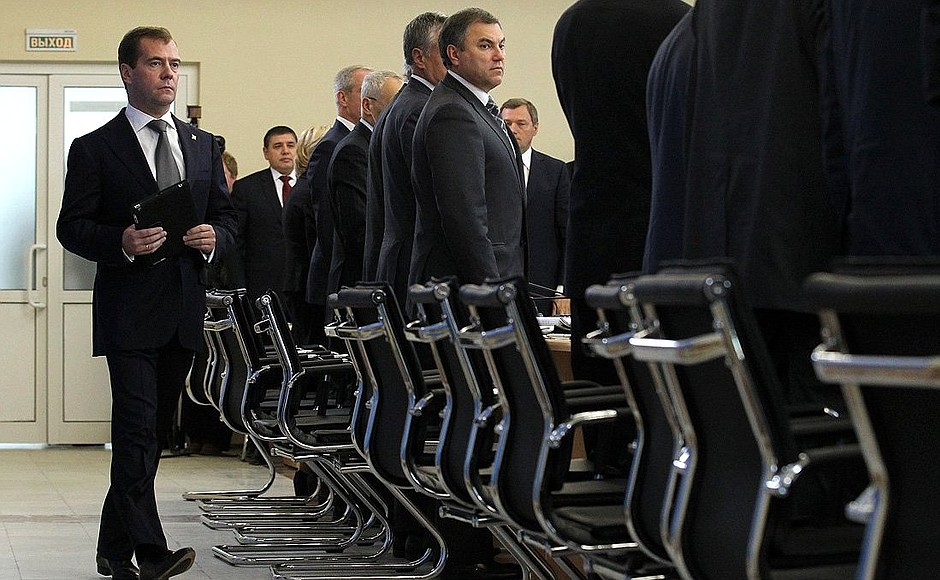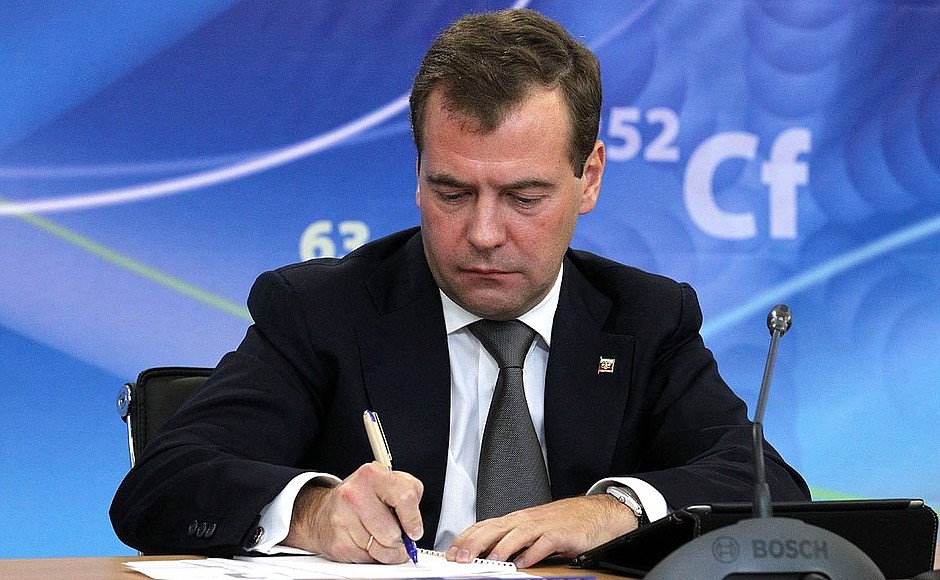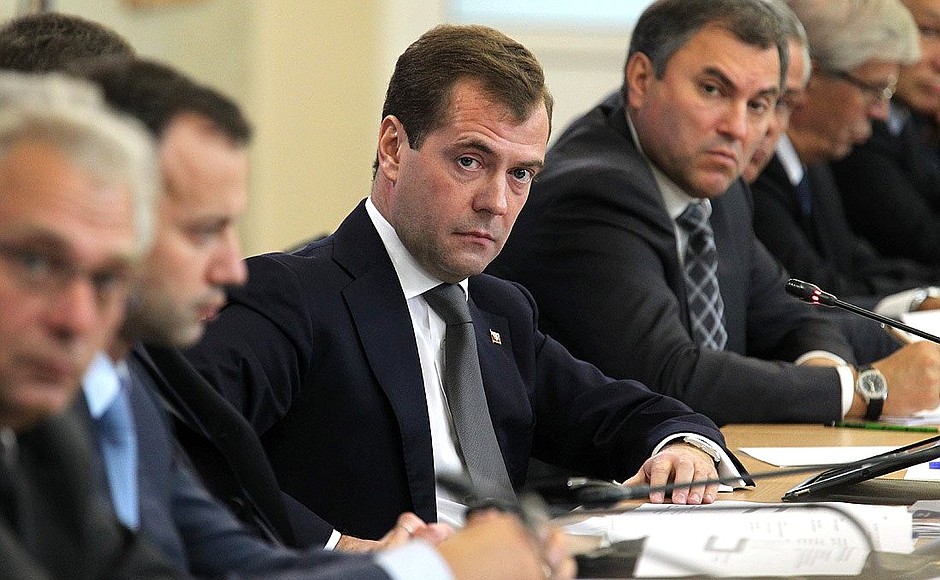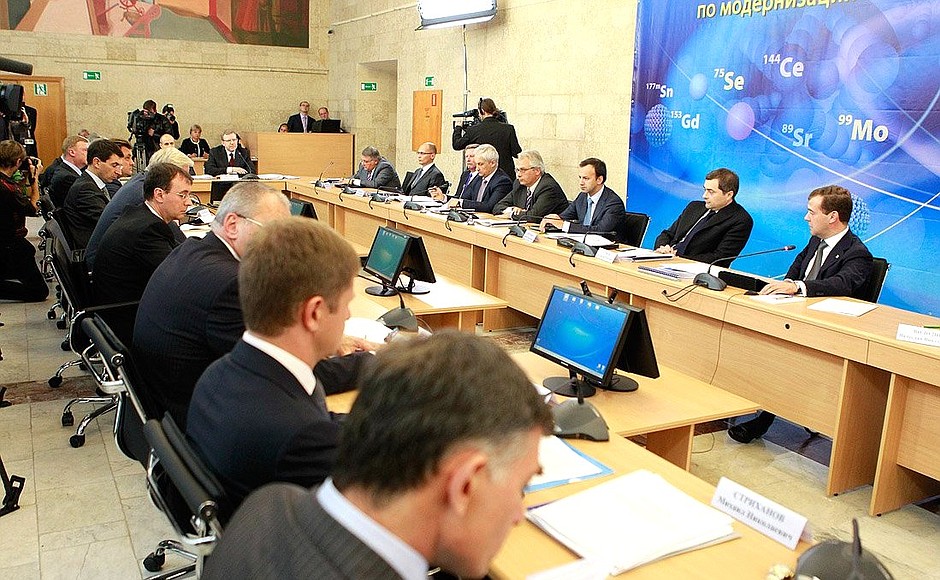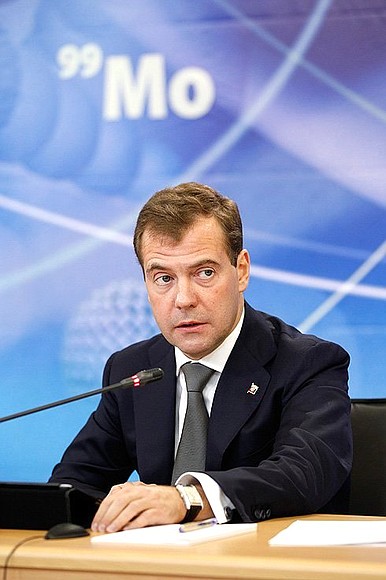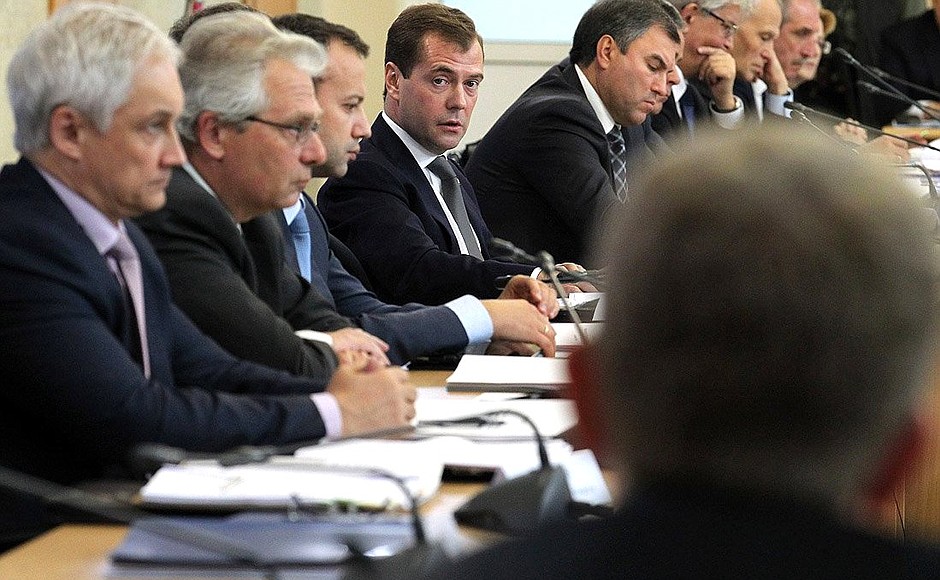In particular, the meeting discussed the need to step up cooperation between universities and employers on improving higher professional education teaching programmes.
The meeting took place at the Research Institute of Atomic Reactors in Dimitrovgrad.
* * *
President of Russia Dmitry Medvedev: Before we start work today, I would first like to say a few words about a matter not directly related to today’s meeting. I am referring to the situation in the global economy, above all in Europe, and how it could affect our economy and financial system.
Quite simply, I want to say that what is happening is obviously worrying, but at the same time, we do have successful experience in handling serious crises. At any rate, we have reached the point today where we do not need to spend time developing new crisis management instruments. I am not suggesting that we need these instruments right now, for the situation is still developing, but whatever the case, I draw the Government’s attention to the need to follow events as closely as possible, analyse development on the European and other markets, and make decisions accordingly.
As before, our priorities are still to keep unemployment in check, ensure the financial system’s stable operation, and fulfil our social commitments. These are things we will discuss further with the Government and Central Bank.
I remind you that we began our modernisation work back when the crisis was in full swing, and in order to avoid the negative impact of a possible second wave of the crisis, we had to strengthen our response models for such situations. I hope we have succeeded in these efforts. I looked over the work underway here at the Research Institute of Atomic Reactors just before. It was a major nuclear energy innovation cluster that was developed here in Dimitrovgrad back in the Soviet period. Indeed, it is probably one of the biggest in the world, at least in terms of reactor density and personnel numbers. It is good that new orders have started coming in again, and that work is underway on the projects selected and approved by the Commission for Modernisation [and Technological Development of Russia’s Economy]. I want to say too that this work really is of a very high standard. What I saw just now looks impressive indeed. What’s more, this cluster’s future development is directly related to the subject on our agenda today.
We are coming back today — from a slightly different angle it is true — to the issue of training highly skilled professional specialists. I remind you that we examined training for engineers and workers at a joint meeting of the Commission and the State Council Presidium about a year ago now. The time has come to look at what has and has not been achieved since then. Furthermore, following my meetings with engineers, I issued quite a long list of instructions. Funding has been increased for training engineers to work in the priority economic sectors. But this is still not enough. We need to pay attention to training for other specialists needed for our economic modernisation and technological development. This is very important work.
Of course, to resolve our human resources problems we first have to have a clear picture of which specialists are in short supply in which particular economic sectors and in which regions of the country. Making this evaluation seems at first glance simple enough, but is actually rather complicated. On my instruction, a system for forecasting employment needs in the different economic sectors was established, and in 2012 it will produce its first evaluations, on the basis of which we will be able to put together state orders for training the needed specialists. This will enable us to avoid both a glut on the market and human resource shortages in this or that profession.
State Corporation Rosatom sets a good example in this respect. We expect to see Rosatom’s demand for highly skilled specialists increase approximately four-fold by 2015. Rosatom has already increased its demand with our universities to train more specialists in the relevant areas. This is good because it shows that the company is looking to the future. I draw the attention of other companies’ heads to this positive experience.
On another positive note, on Wednesday we will mark Nuclear Industry Worker’s Day. I congratulate everyone working in this sector that comes with big responsibility and is so important for our country. I thank you all for your work.
I have had several meetings with students recently. Finding a job is one of the biggest and most topical issues for them. The key question is how much demand will there be for their skills on the labour market, will they be able to put their knowledge to maximum effective use, and, of course, what kind of wages will they be able to earn. I have already issued an instruction for all state universities to set up job centres to help students and postgraduate students find work in their specialist areas, both as part of their in-study training, and after they complete their studies.
In addition, I want us to discuss today the matter of how to encourage companies to take part in this work too. Often when I meet with business representatives, mostly private sector, but from state-owned companies too, they note the poor quality of training. They are not happy with the quality of training our universities provide. I think that they are right on many points. We have decided to establish a system for certifying specialists, and perhaps also a rating system for evaluating the quality of their training. We need to look at whether it is time to change the list of higher professional education teaching programmes, otherwise we end up spending time training specialists in fields that simply no longer exist, or, on the contrary, there is demand for specialists in particular fields, but no one providing the necessary training. This is a common enough situation, unfortunately, even though we are trying to take a market-oriented approach these days.
I would also like to draw the Education Ministry’s attention to the fact that one of the criteria for evaluating universities should be their statistics on graduates’ job placement and employment in their field of study for three years after graduation, because as you know, if someone works for several years, his or her chances of staying in that industry are significantly higher. If a graduate simply doesn’t enter the industry or leaves six months later – that’s entirely different. The rectors at our universities must understand that financial and personnel-related decisions will be made in regard to their institutions based on these indicators.
We have talked multiple times about the need to re-establish contacts between companies and universities, and the need to encourage businesses to participate in the modernisation of laboratories and methodological bases, development and implementation of educational programmes, and teaching staff ‘refreshment’. Finally, employers must spell out their qualification requirements for young graduates more precisely and participate in setting professional educational standards. I feel that this is one of the ways to nudge businesses toward doing this, and this should also be discussed – I am referring to implementing tax breaks for organisations that help universities develop. Companies have talked about it, and we just need to consider how to create incentives for them, because higher education institutions are asking for it to happen, and businesses are constantly discussing it.
Moreover, a draft law has been submitted to the State Duma on regulating the establishment and work of universities’ boards of trustees. They must include business representatives. It is important for them to control the finances and monitor the content of the education programmes; they must really be in the thick of the educational process. Then, at the very least, they will not have cause to complain that students are not being trained correctly. We need to accelerate work on this draft law, and universities should begin forming boards of trustees now, so that by the time the federal law is issued, employers can take full advantage of their new rights.
Here in Dimitrovgrad, there is a system of personnel training where professional screening begins in high school and involves work by major magnet schools, as well as the physics and mathematics boarding school, vocational school and college, a branch of the National Research Nuclear University – Moscow Engineering Physics Institute (MEPhI). This is the right kind of example, and overall, we need to create similar chains elsewhere.
Colleagues, speaking of incentives, it is also imperative to create financial support for recent graduates, colleges, and employers. But in addition, there are moral incentives, which we should not forget, because they are also important. I am talking about increasing the prestige of professions and fields that are currently a priority for modernising our economy.
I already gave corresponding instructions, and some of them have been fulfilled – some formally, and certain others not formally. However, no significant public campaigns have been conducted. I would like you to report on what will be done in the near future.
We’re basically ready to move on to discussing these problems, but I will take a couple more minutes of your time. I would like to say a few words on discipline within the Government Cabinet. Everyone knows that we have entered election season – this is a difficult ordeal for the government system and for certain individuals. I guess that it might also affect some people’s nerves; perhaps that is the reason behind several announcements we have heard recently in our nation and abroad – for example, in the United States of America. Indeed, we have a whole category of citizens who, for some reason, have to cross an ocean to make important announcements.
Well, Mr Kudrin [Deputy Prime Minister and Finance Minister Alexei Kudrin], who is present here, has made the joyful announcement that he does not plan to work in the new Cabinet and that he has some serious differences in opinion with the current President, in particular with regard to expenditures, including defence expenditures. In this regard, I would like to note several things. First of all, we do not have any new Cabinet, and nobody has sent anyone any invitations. But we do have the existing Cabinet, which I formed as President, which is accountable to me and which will work in accordance with my constitutional authority. This Cabinet pursues the President’s policies, and all key decisions are signed by Cabinet members, including the Finance Minister, as regards matters of fiscal policy and a broad range of other issues, including defence spending.
And as far as I understand, Mr Kudrin had the opportunity to state his position earlier, and make a personal decision concerning his political future – and, incidentally, a chance to align with the right-wing parties. They invited him to join, but he declined, apparently, due to some other considerations. Nevertheless, I would like to say that statements of this kind, made in the United States of America, look indecent and cannot be justified in any way.
Second, nobody has cancelled discipline and subordination in the Cabinet. If, Mr Kudrin, you do not agree with the President’s policies (and the Cabinet implements the President’s policies), you have only one way out, and you know what that is: to submit your resignation.
Thus, I will address you directly with the following suggestion. If you feel that your views on the economic agenda differ from the President – that is, myself – then you can write a corresponding letter of resignation. Naturally, you must reply right here and now. Will you be writing a letter of resignation?
Deputy Prime Minister and Finance Minister Alexei Kudrin: Mr President, it is true that you and I have differences in opinion, but I will make my decision concerning your suggestion after consulting with the Prime Minister.
Dmitry Medvedev: You know, you can consult with whomever you want, including the Prime Minister, but as long as I am President, I make these decisions myself.
Alexei Kudrin: You have just asked me to make a decision. I have explained what my decision is.
Dmitry Medvedev: Let me repeat, you must make a decision very quickly.
Alexei Kudrin: Of course.
Dmitry Medvedev: And you must give me an answer today: either you feel that these differences in opinion, as you call them, do not exist, in which case you must comment on this matter; or, if there are indeed differences in opinion, as you just said, I do not see any other way out, although it will of course be unpleasant for me.
And the last thing I would like to say in this context: anybody who has doubts concerning the policies of the President and the Cabinet, or any individual who has his or her own plans in life, has the right to submit to me a letter of resignation. But they should do so openly. Meanwhile, I will have to cut short any irresponsible chatter. And I will make all the necessary decisions, all the way through May 7 of next year. I hope this is clear to everyone.
Now, on that positive note, we can begin working on today’s main agenda.
<…>
